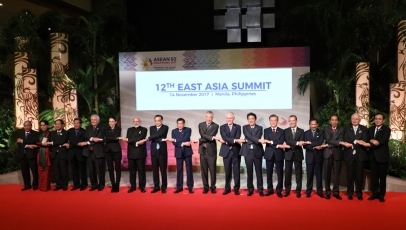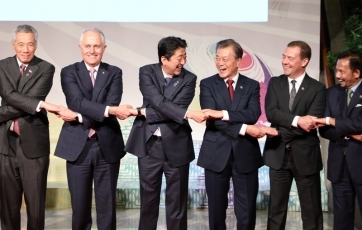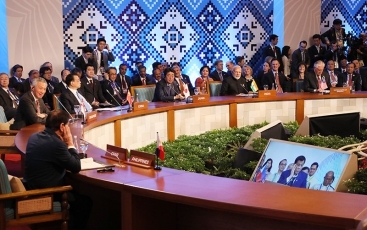Asia
The 12th East Asia Summit
November 14, 2017
 Photo: Cabinet Public Relations Office
Photo: Cabinet Public Relations Office
 Photo: Cabinet Public Relations Office
Photo: Cabinet Public Relations Office
 Photo: Cabinet Public Relations Office
Photo: Cabinet Public Relations Office
On November 14, Prime Minister Mr. Shinzo Abe attended the East Asia Summit (EAS) which was held in Manila, the Philippines. The overview of the meeting which was chaired by H.E. Mr. Rodrigo R. Duterte, President of the Philippines, is as follows.
1 EAS Lunch hosted by President Duterte
Prime Minister Abe emphasized that never has the raison d’être of EAS been tested as it was at this year’s summit meeting. He stated that the regional security environment is becoming unprecedentedly severe and called on the international community to coordinate closer in order to address pressing issues such as North Korea, maritime security, and counterterrorism. He also called on EAS to issue a powerful message to the international community on these issues as the premier forum of the region to discuss strategic issues on policy and security.
2 EAS
(1) Review of the EAS cooperation and its future direction
(a) “Free and Open Indo-Pacific Strategy”
Prime Minister Abe expressed his view that in order to maintain and strengthen the rules-based, free and open maritime order in the Indo-Pacific and make it a global commons that brings stability and prosperity to all countries without discrimination under the “Free and Open Indo-Pacific Strategy,” he intends to (1) seek to establish fundamental values such as freedom of navigation and the rule of law, (2) strengthen connectivity through the development of “high quality infrastructure” and (3) engage in cooperation for peace and stability such as support for capacity building in maritime law enforcement and humanitarian assistance and disaster relief (HA/DR), and shared with participating countries the importance of promoting these efforts.In addition, Prime Minister Abe stated that in light of the current situation Japan will steadily implement its assistance worth 15 billion yen over two years through a comprehensive approach to improve security in the southern part of the Philippines and Sulu-Celebes Seas in order to realize "Asia resilient to terrorism". He also announced that with the aim of further promoting the policy of "Proactive Contribution to Peace", Japan would expand human resource development, provision of supplies and equipment, and intellectual contribution in three areas: maritime safety; humanitarian assistance and disaster relief (HA/DR); and peacekeeping operations (PKO). In this regard, he stated that Japan's newly-organized team specialized in capacity building was implementing training programs for their colleagues from the Philippines, Vietnam, Indonesia and Malaysia in cooperation with the U.S. during the period of the ASEAN Summit and Related Meetings.
Furthermore, he announced that Japan would advance the development of “quality infrastructure” in accordance with international standards such as openness, transparency, and economic efficiency of infrastructure as well as ensuring the financial viability of recipient countries and promote the realization of “vibrant connectivity” through institutional reform and human resource development in collaboration with other countries and organizations.
He also announced that in order to promote the usage of natural gas in East Asia, Japan would implement financial assistance in this region to the amount of approximately USD 10 billion in public and private sector funds in cooperation with the United States, in addition to assistance for institutional and human resource development related to LNG.
(b) Promotion of free trade system
Prime Minister Abe advocated that East Asia should make clear the importance of free and open trade and investment, and assessed that the fact that 11 countries reached an agreement at the ministerial level on TPP was a manifestation of a powerful collective will to that effect. With regard to RCEP, the Prime Minister emphasized a desire to promptly conclude a high-quality agreement to support regional economic growth.There were statements from many leaders to the effect that protectionism should be eliminated and free trade promoted through such means as going forward with RCEP.
(c) ERIA
Prime Minister Abe stated that Japan attaches importance to the activities of the Economic Research Institute for ASEAN and East Asia (ERIA) and expressed hope that it would come forth with recommendations that better reflect policy needs in broad areas.(2) Regional and international situation
(a) North Korea
Prime Minister Abe stated that North Korea has persistently continued its nuclear and missile programs, conducting nuclear tests and two ballistic missile launches that flew over Japan, and emphasized that there could be no peace in the region without the denuclearization of the Korean Peninsula. The Prime Minister also stressed that it was necessary for the international community to maximize pressure on North Korea and that it was important for EAS to issue a clear message on strengthening pressure on North Korea. Furthermore, he stated that the UN Security Council resolution adopted in September contains drastically stricter measures and urged that pressure be strengthened through all means available, including the review of “diplomatic” relations with North Korea, restriction on exports and imports, restrictions on the movement of people, the monitoring of North Korea’s “diplomatic corps”, and tightening restrictions on North Korean laborers. He further advocated that the resolution of the issue of the abductions by North Korea was one of the most important issues for his administration and pressure was important for its early resolution.Almost all the leaders took up the situation in North Korea, and there were many statements expressing concern over the development of nuclear weapons and ballistic missiles, and urging compliance with the UN Security Council resolutions by North Korea, given that the series of provocative actions by North Korea were violations of UN Security Council resolutions and a threat to the peace and stability of the international community.
(b) Maritime security
Prime Minister Abe stated with regard to the South China Sea issue that Japan wholeheartedly supported the basic principles laid out in the Joint Communiqué of the ASEAN Foreign Ministers’ Meeting issued in August. Prime Minister Abe also stressed that all the countries concerned should strictly adhere to the “three principles of the rule of law on the seas” which he has consistently advocated for. Furthermore, he expressed Japan’s continuing concerns over the situation in the South China Sea. In addition, he welcomed the recent development of forward-looking efforts by China and ASEAN including dialogues to finalize the Code of Conduct on the South China Sea, expressed expectation for the early conclusion of an effective COC and emphasized that easing tensions through such efforts should lead to “demilitarization.”Most of the leaders took up the South China Sea issue and gave statements about the importance of securing freedom of navigation and peacefully resolving disputes according to international law including UNCLOS. In addition, multiple countries expressed concern over the recent situation in the South China Sea and advocated the importance of non-militarization and self-restraint.
(Situation in Rakhine State)
Regarding the situation in Rakhine State, Prime Minister Abe advocated that restoring public safety while taking the rule of law and human rights into consideration, expanding humanitarian access, and progress in consultations among the parties concerned towards the return and resettlement of the displaced people were necessary. He also announced that Japan would be encouraging forward-looking efforts by the Myanmar Government by implementing humanitarian assistance through the AHA Center and other means.
H.E. Ms. Aung San Suu Kyi, State Counsellor of the Republic of the Union of Myanmar, briefly stated about the current situation by the Myanmar Government. Many leaders indicated concern over the humanitarian situation in North Rakhine.
- Chairman's Statement(PDF)
 (316KB)
(316KB)

